|
|
|
Sort Order |
|
|
|
Items / Page
|
|
|
|
|
|
|
| Srl | Item |
| 1 |
ID:
169997
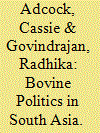

|
|
|
|
|
| Summary/Abstract |
This introduction outlines how the essays in this special section contribute to scholarship on cow protection in India. It argues that they disrupt three powerful framing binaries—religion/economy, legality/illegality and cow-lover/cow-killer—that have tended to dominate the literature on cow protection. Making tangible the analytical limits of these categories, the essays find new critical leverage in the everyday situated relationships between humans, bovines and the state. The essays are distinguished by their attention to bovines as creative and productive forces that are not mere symbols for human politics, but materially embodied and agentive beings that play a significant role in shaping the social and political worlds which emerge around them.
|
|
|
|
|
|
|
|
|
|
|
|
|
|
|
|
| 2 |
ID:
191118
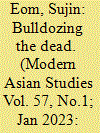

|
|
|
|
|
| Summary/Abstract |
This article looks at lawsuits surrounding two Chinese cemeteries in the mid-twentieth century South Korean cities of Incheon and Seoul as crucial sites to examine the post-colonial legal construction of national citizenry based on property rights. While different legal rationales were employed in each case, the two Chinese cemeteries were relocated to the periphery of each city as a consequence of the litigation. In Incheon, it was argued that the cemetery was owned by Chinese nationals whose land rights were ambiguous and hence open to question, both during the colonial and post-colonial period. On the other hand, in Seoul, rights to the cemetery were at stake due to its association with Japanese nationals, whose holdings were regarded as ‘enemy properties’ in the post-colonial years. Not only were the lawsuits symbolic events that foreshadowed the displacement of Chinese residents from what was considered to be Korea's national land, they also revealed an operative ambiguity in the post-colonial legal system, readily exploited as a tool for discrimination. Drawing upon an analysis of these cases, I argue that the Chinese cemeteries served as a reminder that uncertainty and ambiguity were on tap in the legal workings of post-colonial society, manifested in blunt efforts to define its legitimate members and dictate who is entitled to be buried within a nation's borders.
|
|
|
|
|
|
|
|
|
|
|
|
|
|
|
|
| 3 |
ID:
178921
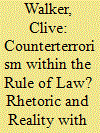

|
|
|
|
|
| Summary/Abstract |
The rule of law remains a hallowed principle even in the unpromising environment of counterterrorism, but failures to live up to rule of law rhetoric must be highlighted. As a result, one might question whether counterterrorism can realistically be conducted wholly in accordance with the rule of law. So, is the rule of law rhetoric or reality? In practice, it remains exceptional for states to resort to express or wide derogations from rule of law standards because of counterterrorism, but notable exceptions in reality undermine the rhetoric of rule of law dominion. By dissecting the rule of law into its constituent components, it is possible to gain a clearer picture of strong and weak points in the rule of law, though no single doctrine, instrument or institution can be found to offer transformational reinforcement. In view of the permanence of counterterrorism, the model required is neither one of accommodation nor an unthinking acceptance of framing ideas such as “the war on terror.” Instead, the rule of law rhetoric demands constant refinement and renewal within the mechanisms of constitutionalism in order to support the reality of rule of law. These precepts will be considered in the context of counterterrorism experiences in the United Kingdom.
|
|
|
|
|
|
|
|
|
|
|
|
|
|
|
|
| 4 |
ID:
184146
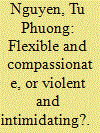

|
|
|
|
|
| Summary/Abstract |
This paper provides a bottom-up analysis of law in daily life in Vietnam through an empirical study of low-income residents’ engagement in illegal housing activities in a peri-urban area of Ho Chi Minh City. Different from most existing studies of law and social change which take the formal institutional framework of law as their starting point, this paper examines the uses and meanings of law as products of interactions between citizens, local authorities, and intermediary actors. From an in-depth analysis of the residents’ stories, it argues that the role of law within daily life in Vietnam must be understood through the enactment of two opposing, but mutually connected, forms of legality. One form emphasizes informality and sentiment, while the other emphasizes violence and intimidation. The former accommodates and answers to people’s survival needs, while the latter constrains if not suppresses those needs. These forms of legality are mutually connected because they unfold in an ambiguous area of law enforcement that is largely subject to local authorities’ arbitrary discretion. These findings allow for a conceptualization of everyday legality in which law is both manipulable and emancipatory, but also disadvantageous and sanctioning.
|
|
|
|
|
|
|
|
|
|
|
|
|
|
|
|
| 5 |
ID:
134372
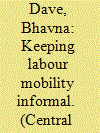

|
|
|
|
|
| Summary/Abstract |
Kazakhstan's legal–regulatory framework provides for a small number of quotas for highly skilled foreign workers but has no provisions for legal employment of semi-skilled or low-skilled migrants from the Central Asian states, who enter under the Commonwealth of Independent States (CIS) visa-free regime and work informally in construction, household and service sectors. The lack of acknowledgement of the scale of informal labour migration has denoted an act of strategic neglect on the part of the state, allowing it to render migrant labour illegal, disposable, and keep migrants legally and statistically invisible. Unable to obtain a legal status, migrants nominally comply with the existing legal framework as they also circumvent and subvert it. The article details the entrenched informal regime of labour migration and explains why recent efforts to ‘legalize’ labour through the introduction of a labour patent (licence), as is the case in Russia, are unlikely to bring in significant reforms.
|
|
|
|
|
|
|
|
|
|
|
|
|
|
|
|
| 6 |
ID:
071097
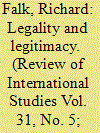

|
|
|
| 7 |
ID:
178155
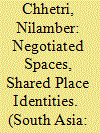

|
|
|
|
|
| Summary/Abstract |
Succeeding waves of mobilisation for the separate state of Gorkhaland has left an indelible imprint on the cultural, political and urban landscape of the Darjeeling Hills. Based on empirical research, this paper tries to explore the intricate relationship between ethnicity, place and politics of belonging in the Himalayan town of Kalimpong. It specifically tries to locate the interface between political events and the transformation of the urban landscape by taking into consideration the growth of roadside settlements. While noting the specific contours of these settlements, their culture and their liminal condition, the paper tries to address the issues pertaining to place-making and identity formation in the Himalayan region.
|
|
|
|
|
|
|
|
|
|
|
|
|
|
|
|
| 8 |
ID:
186946
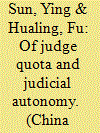

|
|
|
|
|
| Summary/Abstract |
This article presents the findings of original research on “judge quota” reform. The reform's agenda was essentially aimed at professionalization: by edging out a given percentage of judges, only the better qualified judges would be re-appointed to create a more professionalized judiciary. A key component of the reform was to reduce the level and the intensity of both political and bureaucratic control over judges in adjudication and to decentralize judicial power to the rank-and-file judges, restoring individualized judging while enhancing judicial accountability. This article critically examines the potential and limits of the judge quota reform in the context of incremental legal reform in a party-state.
|
|
|
|
|
|
|
|
|
|
|
|
|
|
|
|
| 9 |
ID:
153019
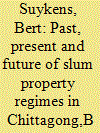

|
|
|
|
|
| Summary/Abstract |
This article argues for the need to take time into account when understanding land ownership in slums. It shows that this allows comprehending more accurately the place of land law and the specific forms that legal struggles over land take. Field research in a slum in Chittagong (in Bangladesh) reveals that while contemporary practices of ownership and transfer might appear to be informal and illegal, they are not only grounded in historical forms of legal land settlement, embedded in a long-standing court battle over legal ownership, but also the product of expectations related to the (legalised) future. Finally, urban planning, with a state-sponsored vision of the future of slums, further complicates the role of the law.
|
|
|
|
|
|
|
|
|
|
|
|
|
|
|
|
| 10 |
ID:
145413
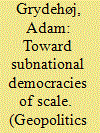

|
|
|
|
|
| Summary/Abstract |
Although democracy is often discussed as a universally applicable ideology, the liberal democratic state tends to assess democracy on the basis of government institutions. This paper argues that democratic institutionalism favours national governments and makes it difficult for subnational governments to expand their governance capacity and exercise additional powers. Greenland, Shetland, and Tresco (Isles of Scilly) serve as case studies of different subnational strategies for exercising greater governance capacity: 1) Actual adherence to democratic form (Greenland), 2) Symbolic adherence to democratic form (Shetland), and 3) Operating external to democratic form (Tresco). Despite the efforts of local governance actors, governance in these three island communities has proved problematic in terms of democratic legitimacy, legality, and/or effectiveness. It is argued that pressure toward the development of liberal democratic government institutions can in fact decrease the quality of subnational democracy. This requires a reassessment of definitions of democracy and authoritarianism. It is necessary to pursue place-specific and community-sensitive democracies of scale if we wish to democratically empower local communities.
|
|
|
|
|
|
|
|
|
|
|
|
|
|
|
|
|
|
|
|
|